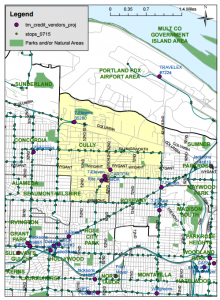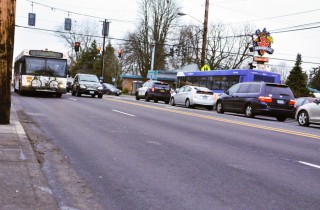less driving and more cycling.
(Photo: J. Maus/BikePortland)
One year after it persuaded TriMet to add 30 minutes to the life of every transit fare, a local transit advocacy group has a new goal.
Bus Riders Unite, a rider-led project of OPAL Environmental Justice Oregon, will launch a new campaign chosen by its members: for the Portland region’s transit system to follow Seattle’s and San Francisco’s by offering lower transit fares to lower-income people.
“We think the most reasonable and simplest approach would be to let low-income people have the same fare honored citizens currently receive,” said OPAL spokesman Shawn Fleek.
Due in part to federal law, TriMet offers half-price tickets to people ages 65 and up, people on Medicare and people with disabilities, a grouping the agency refers to as “honored citizens.”
But over the years, U.S. poverty trends have shifted. As of 2014, 15 percent of Oregonians age 19 to 64 live in poverty. So do 20 percent of Oregonians under age 19. For Oregonians aged 65 and up, the figure is 7 percent.
Income-tested fares are difficult for transit agencies to offer without digital records for every rider. But cashless card systems, like the Hop Fastpass that TriMet will introduce in 2017, create those digital records, making income-tested fares much easier.
The Seattle area’s ORCA LIFT program, created last year, uses the cashless ORCA card to charge a flat $1.50 fare for all trips by people in households that make less than twice the federal poverty line.
New cashless card system could make income-tested fares easier

(Photo: M.Andersen/BikePortland)
Bus Riders Unite also has two concerns about Hop Fastpass, though. Though the cashless cards are designed to be used by individuals for years, getting a new card will usually require people to travel to one of TriMet’s retail partners.
For example, here’s a map of the bus stops in the Cully area (green dots) along with the closest places to get a Hop Fastpass (purple dots):
So BRU is also including a request in its campaign to sell the cards at more locations.
“Every convenience store, every grocery store,” Fleek said. “We want them at social service agencies, public libraries.”
The third goal for BRU is for TriMet to offer a type of card that could be tapped multiple times to buy fares for everyone in a family.
“The electronic fare system is one-card-one-person at the moment,” said Fleek. “If you’re a mom getting on the bus with three kids then you have to have four cards.”
Each card will require a one-time $5 payment in addition to bus fare.
TriMet already agreed, after earlier pressure from BRU, to distribute 200,000 Hop Fastpasses for free. But BRU says that after those run out, families looking to start riding transit will still be cost-burdened unless there’s a “family card” option.
Where would the money come from?
Bus Riders Unite hasn’t yet attempted to estimate the cost of their proposal to TriMet.
The pricetag would depend on the income cutoffs for getting discounted fares. Fleek said BRU feels that the more people get discounts, the better.
“We always want to strive for the most inclusive definition of ‘low-income’ possible,” said Fleek.
In 2017, TriMet expects to bring in $121 million from fares. That’s enough to cover 21 percent of its operating revenue.
Fleek said that even if fare revenue were to go down as a result of the program, it would be possible to “find efficiencies within TriMet,” possibly by cutting its budgets for marketing ($15 million) or policing ($17 million). He also said TriMet’s board has the ability to levy new taxes — notably an income tax.
Last month, TriMet testified in support of a state legislative bill that would have given it the authority to hike payroll taxes, which are similar to income taxes but narrower and somewhat less progressive. OPAL, speaking on behalf of Bus Riders Unite, opposed the bill, saying (among other things) that an income tax hike would be better.
After that exchange, TriMet spokeswoman Mary Fetsch said that TriMet’s board prefers hiking the existing payroll tax to creating a new transit income tax in part because the income tax might be more likely to stir political resistance.
“Any fee or tax implemented as a result of board action may be referred to the voters by petition, so the board must carefully consider community sentiment as it considers funding options,” Fetsch wrote in an email.
OPAL is hosting a rally and press conference on Friday March 18th to raise awareness and build support for their demands.
— Michael Andersen, (503) 333-7824 – michael@bikeportland.org
BikePortland can’t survive without subscribers. It’s just $10 per month and you can sign up in a few minutes.
The post Bus riders’ union launches new campaign: Discount fares for low-income people appeared first on BikePortland.org.
from Front Page – BikePortland.org http://ift.tt/229gF38


No comments:
Post a Comment